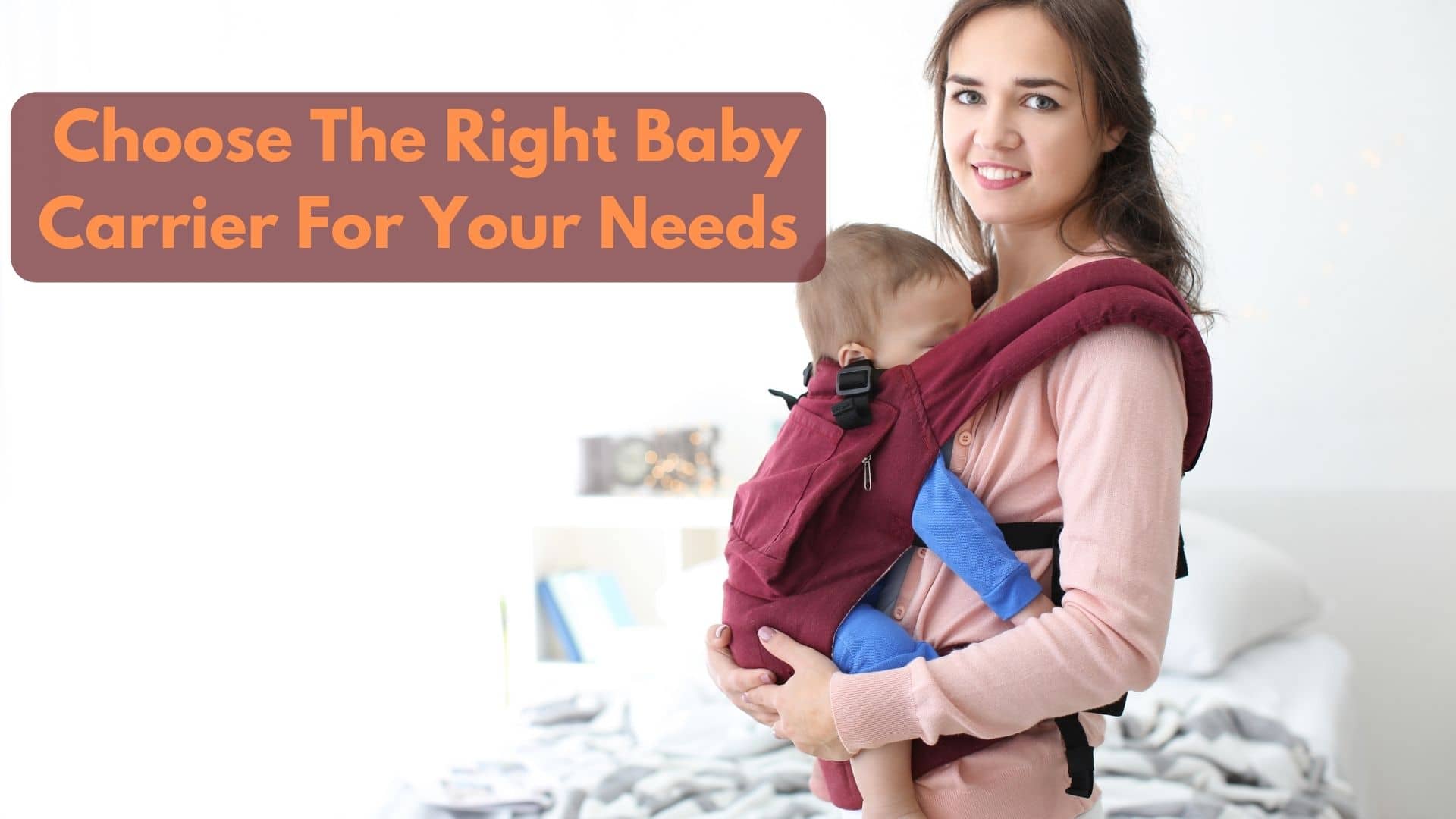Are you a new parent or soon-to-be parent wondering how to choose the perfect baby carrier? With so many options available, it can be overwhelming to navigate through the sea of choices. But don’t worry, we’ve got you covered! In this article, we’ll provide you with some helpful tips and guidelines to help you find the right baby carrier that suits your needs and preferences.
Whether you’re looking for something ergonomic, easy to use, or stylish, we have all the information you need to make the best decision for you and your little one. Choosing the right baby carrier can be an overwhelming task with the plethora of options available in the market. From wrap carriers to backpack carriers, there are various types to suit different needs and preferences.
In this article, we will explore the different types of baby carriers and discuss the considerations you should keep in mind when choosing one. We will also evaluate various features that you should look for in a baby carrier and provide tips on how to try them out before making a decision. Lastly, we will discuss how you can seek recommendations from friends, family, parenting communities, healthcare professionals, and babywearing consultants.
Types of Baby Carriers
Wrap Carriers
Wrap carriers are versatile and suitable for newborns to toddlers. They consist of a long strip of fabric that is wrapped around your body to create a secure and comfortable carrying position for your baby. Wrap carriers offer excellent support and adjustability, allowing you to find the perfect fit for you and your little one. However, they can be more challenging to learn to use, and the fabric can be bulky for some parents.
Ring Sling Carriers
Ring sling carriers are a popular choice for parents looking for a quick and easy way to carry their babies. They feature a long piece of fabric that is threaded through two rings, creating a pouch for your baby. Ring slings offer adjustability and a snug fit, making them suitable for newborns and older babies. They are also compact and easy to carry around. However, they may put strain on one shoulder and require regular adjustments to maintain the proper positioning.
Soft Structured Carriers
Soft Structured Carriers (SSCs) are a popular choice among parents who value convenience and comfort. SSCs have padded shoulder straps and a waist belt, distributing the baby’s weight evenly and reducing strain on your back. They are easy to put on and take off, making them an excellent option for parents on-the-go. SSCs are suitable for newborns and toddlers, but they may not offer the same level of closeness and adjustability as wrap or ring sling carriers.
Meh Dai Carriers
Meh Dai carriers, also known as Asian-style carriers, combine the benefits of both wraps and SSCs. They have a rectangular body panel with long straps that you can tie around your waist and shoulders. Meh Dai carriers are versatile and suitable for newborns to toddlers. They offer a customizable fit, and their hybrid design provides both the support of a SSC and the adjustability of a wrap. However, learning to tie the straps properly may require some practice.
Backpack Carriers
Backpack carriers are designed for outdoor adventures and longer trips. They feature a sturdy frame and a built-in seat for your baby, allowing you to carry them comfortably on your back. Backpack carriers provide excellent support and are suitable for older babies and toddlers who can support their head and sit independently. However, they can be bulky and heavy, making them less practical for everyday use.
Considerations Before Choosing
Baby’s Age and Weight

Source: TheTechBrain AI
When choosing a baby carrier, consider your baby’s age and weight. Some carriers are specifically designed for newborns, while others are more suitable for older babies and toddlers. Make sure the carrier you choose can accommodate your baby’s weight and provide the necessary support for their age.
Your Comfort
Your comfort is just as important as your baby’s. Look for a carrier that distributes the weight evenly across your body and has padding in the shoulder straps and waist belt. It should fit you properly and not cause any discomfort or strain, even during extended periods of use.
Ease of Use
Consider how easy the carrier is to use, especially if you will be using it frequently or on your own. Look for carriers that are simple to put on and take off, with intuitive adjustments. Some carriers may have buckles or snaps, while others require tying or adjusting straps.
Support and Safety
Safety should be a top priority when choosing a baby carrier. Ensure that the carrier provides proper support for your baby’s head, neck, and spine. Look for carriers with adjustable features that allow you to create a secure and ergonomic carrying position for your little one.
Budget
Consider your budget when choosing a baby carrier. While some carriers can be quite expensive, there are also affordable options available. Decide how much you are willing to spend and look for carriers that fit within your budget while still meeting your needs.
Also Check: How To Select Safe And Stimulating Activity Centers?
Evaluating Features
Ergonomics
Ergonomics is an essential factor to consider when choosing a baby carrier. Look for carriers that promote the natural position of your baby’s hips and spine, with their legs flexed and spread apart. The carrier should evenly distribute the baby’s weight, avoiding any unnecessary pressure points.
Adjustability
An adjustable carrier allows you to customize the fit as your baby grows. Look for carriers with multiple adjustment points, such as shoulder straps and waist belts. This will ensure that you can find the most comfortable and secure fit for both you and your baby.
Versatility
Consider how versatile the carrier is in terms of carrying positions. Some carriers allow for various positions, such as front carry, hip carry, or back carry. This versatility can be beneficial as your baby grows and may provide different options for different activities or situations.
Fabric
The fabric of the carrier plays a role in both comfort and durability. Look for carriers made from high-quality, breathable materials that are gentle on your baby’s skin. Consider the climate you live in and choose a fabric that suits the weather conditions.
Cleaning and Maintenance
Babies can be messy, so it’s essential to consider how easy it is to clean and maintain the carrier. Look for carriers that are machine washable or have removable and washable parts. This will ensure that your carrier stays clean and fresh for your baby’s comfort.
Trying Them Out
Visit a Retail Store
One of the best ways to choose a baby carrier is by visiting a retail store that specializes in baby products. Try on different carriers, adjust them to fit you and your baby, and test how they feel. This hands-on experience will give you a better idea of which carriers are the most comfortable and suitable for your needs.
Participate in Babywearing Groups
Joining babywearing groups in your community can provide valuable insights and opportunities to try different carriers. These groups often organize meetups where parents can gather and share their experiences with different carriers. You can observe how others use different carriers and even borrow or try them out yourself.
Rent or Borrow Carriers
If you’re unsure about investing in a carrier right away, consider renting or borrowing carriers from a babywearing library or from friends who own them. This will give you the chance to test different carriers for an extended period and understand how they work in different situations.
Read Reviews
Reading reviews from other parents can provide valuable insights into different carriers. Look for reviews that discuss comfort, ease of use, and durability. However, keep in mind that everyone’s preferences and experiences can be different, so it’s always best to try a carrier for yourself before making a final decision.
Ask for Recommendations
Friends and Family
Reach out to friends and family members who have used baby carriers and ask for their recommendations. They can provide firsthand insights into the carriers they have used and help you make an informed decision.
Parenting Communities
Online parenting communities, such as forums or social media groups, can be a great resource for seeking recommendations. These communities often have discussions dedicated to baby carriers, where parents share their experiences and recommend their favorite brands or models.
Healthcare Professionals
Consulting healthcare professionals, such as pediatricians or lactation consultants, can provide valuable advice on choosing a baby carrier. They can help you understand the benefits of babywearing and guide you towards carriers that promote optimal development for your baby.
Babywearing Consultants
If you want personalized guidance in choosing a baby carrier, consider seeking help from a babywearing consultant. These professionals are trained in babywearing safety and ergonomics and can provide expert advice tailored to your specific needs and preferences.
Conclusion
Choosing the right baby carrier requires careful consideration and evaluation of various factors. By understanding the different types of carriers, considering your needs and preferences, evaluating the features that matter to you, trying them out in person, and seeking recommendations from trusted sources, you can find the perfect baby carrier that suits both you and your little one. Happy babywearing!
